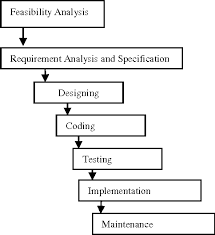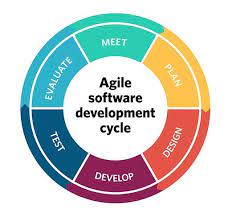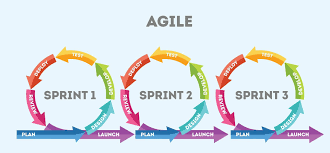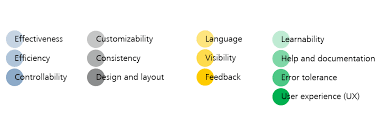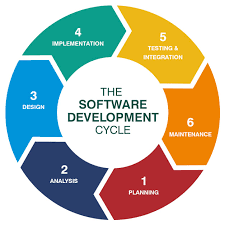Empowering Success: The Role of a Software Development Team in Building Innovative Solutions
The Role of a Software Development Team in Building Successful Products
In the fast-paced world of technology, software development teams play a crucial role in bringing innovative products to life. A software development team typically consists of talented individuals with diverse skills and expertise working together towards a common goal.
Collaboration and Communication
Effective collaboration and communication are key aspects of a successful software development team. Team members must work closely together, sharing ideas, providing feedback, and solving problems collectively. Clear communication helps in ensuring that everyone is on the same page and working towards the project’s objectives.
Technical Expertise
Software development teams are made up of professionals with various technical skills, such as programmers, designers, testers, and project managers. Each team member brings their unique expertise to the table, contributing to the overall success of the project. By leveraging their technical knowledge and experience, the team can overcome challenges and deliver high-quality software solutions.
Adaptability and Innovation
In today’s dynamic market environment, software development teams must be adaptable and innovative. They need to stay updated on the latest technologies and trends in order to create cutting-edge products that meet user demands. By embracing change and continuously improving their processes, teams can stay ahead of the competition and deliver exceptional results.
Quality Assurance
Quality assurance is an essential part of any software development process. Testing and debugging are crucial steps that ensure the final product meets quality standards and functions as intended. Software development teams dedicate time and resources to thorough testing procedures to identify and resolve any issues before deployment.
Conclusion
A well-functioning software development team is instrumental in building successful products that meet user needs and exceed expectations. By fostering collaboration, leveraging technical expertise, embracing innovation, and prioritizing quality assurance, these teams can drive innovation and deliver value to both businesses and end-users.
8 Key Advantages of a Successful Software Development Team
- Collaborative work environment fosters creativity and innovation.
- Diverse skill sets lead to comprehensive problem-solving approaches.
- Efficient project management ensures timely delivery of software solutions.
- Continuous learning and skill development keep the team up-to-date with technology trends.
- Quality assurance processes enhance the reliability and functionality of the software.
- Effective communication facilitates smooth coordination among team members.
- Flexibility to adapt to changing requirements and market dynamics.
- Strong team spirit boosts morale and motivation, leading to higher productivity.
Overcoming Key Challenges in Software Development Teams: Communication, Prioritization, Team Dynamics, and Technical Debt
- Communication challenges may arise due to differences in technical jargon and perspectives among team members.
- Conflicting priorities and timelines can lead to project delays and inefficiencies within the software development team.
- Team dynamics issues, such as lack of cohesion or conflicts between team members, can hinder productivity and morale.
- Technical debt accumulation from rushed or poorly planned development decisions can impact the long-term stability and scalability of software projects.
Collaborative work environment fosters creativity and innovation.
A collaborative work environment within a software development team is a powerful pro that fosters creativity and innovation. When team members come together to share ideas, provide feedback, and brainstorm solutions, they create a fertile ground for innovation to flourish. By leveraging the diverse perspectives and expertise of each team member, new ideas are generated, problems are solved more effectively, and creative solutions are developed. This collaborative spirit not only boosts morale and teamwork but also leads to the creation of innovative software products that can meet the evolving needs of users in today’s dynamic market landscape.
Diverse skill sets lead to comprehensive problem-solving approaches.
Having a software development team with diverse skill sets is a significant advantage as it enables the team to approach problem-solving from multiple perspectives. Each team member brings their unique expertise and experience to the table, allowing for comprehensive analysis and innovative solutions to complex challenges. By combining different skill sets, such as programming, design, testing, and project management, the team can tackle problems from various angles, leading to more effective and well-rounded solutions. This diversity in skills fosters creativity and encourages out-of-the-box thinking, ultimately enhancing the team’s problem-solving capabilities and driving success in software development projects.
Efficient project management ensures timely delivery of software solutions.
Efficient project management within a software development team is a critical factor that ensures the timely delivery of software solutions. By establishing clear timelines, setting achievable milestones, and closely monitoring progress, project managers can effectively coordinate team efforts and resources to meet deadlines. This proactive approach helps in identifying potential bottlenecks early on, making necessary adjustments, and ensuring that the project stays on track for successful and timely completion. Effective project management not only enhances productivity but also instills confidence in clients and stakeholders regarding the team’s ability to deliver high-quality software solutions within the agreed-upon timeframe.
Continuous learning and skill development keep the team up-to-date with technology trends.
Continuous learning and skill development within a software development team are essential factors that keep the team up-to-date with technology trends. By investing time and resources in acquiring new knowledge and honing their skills, team members can stay abreast of the latest advancements in the industry. This proactive approach not only ensures that the team remains competitive but also enables them to leverage emerging technologies to enhance their development processes and deliver cutting-edge solutions to clients.
Quality assurance processes enhance the reliability and functionality of the software.
Quality assurance processes play a critical role in enhancing the reliability and functionality of software developed by a software development team. By implementing rigorous testing procedures and thorough debugging practices, the team can identify and rectify any potential issues or bugs in the software before it is released to users. This meticulous approach not only ensures that the software meets quality standards but also improves user experience by delivering a product that is stable, secure, and performs as intended. Ultimately, quality assurance processes contribute to building trust with users and establishing a reputation for producing high-quality, reliable software solutions.
Effective communication facilitates smooth coordination among team members.
Effective communication within a software development team is a critical pro that facilitates smooth coordination among team members. By fostering open and clear communication channels, team members can easily share ideas, provide feedback, and address any challenges that may arise during the development process. This ensures that everyone is aligned with the project goals and timelines, leading to improved collaboration, increased productivity, and ultimately, successful project outcomes.
Flexibility to adapt to changing requirements and market dynamics.
Software development teams possess the invaluable pro of flexibility to adapt to changing requirements and market dynamics. In the ever-evolving landscape of technology, being able to pivot quickly and adjust to new demands is crucial for success. These teams have the capability to modify their strategies, incorporate new features, and respond promptly to market shifts. By staying agile and adaptable, software development teams can ensure that their products remain relevant and competitive in a rapidly changing environment.
Strong team spirit boosts morale and motivation, leading to higher productivity.
Strong team spirit within a software development team is a powerful pro that significantly impacts productivity. When team members have a sense of camaraderie and unity, it boosts morale and motivation levels. This positive atmosphere fosters collaboration, communication, and a shared commitment to achieving common goals. As a result, team members are more engaged, enthusiastic, and driven to perform at their best, ultimately leading to higher productivity levels and the successful delivery of quality software solutions.
Communication challenges may arise due to differences in technical jargon and perspectives among team members.
Communication challenges can often arise within a software development team due to differences in technical jargon and perspectives among team members. These disparities can lead to misunderstandings, delays in project timelines, and even errors in the final product. It is crucial for team members to bridge these communication gaps by actively listening, seeking clarification when needed, and fostering a culture of open dialogue to ensure that everyone is on the same page and working towards a common goal. By addressing these challenges proactively, software development teams can enhance collaboration, improve efficiency, and deliver successful outcomes.
Conflicting priorities and timelines can lead to project delays and inefficiencies within the software development team.
Conflicting priorities and timelines within a software development team can significantly impact project outcomes. When team members have diverging goals or are working under conflicting deadlines, it can result in project delays, inefficiencies, and reduced productivity. This lack of alignment can lead to misunderstandings, rework, and overall project setbacks, ultimately hindering the team’s ability to deliver high-quality software solutions in a timely manner. Effective communication and project management strategies are essential to mitigate these challenges and ensure that the team remains focused on shared objectives to drive successful project completion.
Team dynamics issues, such as lack of cohesion or conflicts between team members, can hinder productivity and morale.
Team dynamics issues within a software development team, such as a lack of cohesion or conflicts between team members, can significantly impede productivity and dampen morale. When team members struggle to work together harmoniously or face interpersonal conflicts, it can create a negative work environment that hampers collaboration and innovation. These dynamics not only disrupt the flow of work but also impact the overall motivation and job satisfaction of team members. Addressing and resolving such issues promptly is crucial to fostering a positive team culture and ensuring the team can effectively work towards achieving its goals.
Technical debt accumulation from rushed or poorly planned development decisions can impact the long-term stability and scalability of software projects.
Technical debt accumulation resulting from rushed or poorly planned development decisions poses a significant con for software development teams. This burden can have detrimental effects on the long-term stability and scalability of software projects. When shortcuts are taken or proper planning is neglected in the development process, it can lead to inefficiencies, increased maintenance costs, and decreased overall quality of the software. Addressing technical debt is crucial to ensure that the software remains sustainable, adaptable, and able to meet evolving requirements over time. Failure to manage technical debt can hinder progress, limit future development possibilities, and ultimately impact the success of the project.







